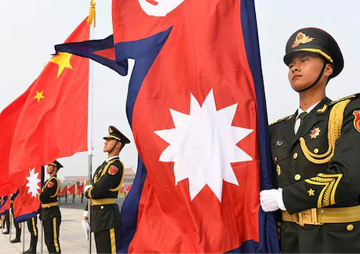In a significant though controversial policy intervention, Jammy and Kashmir Chief Minister Mehbooba Mufti last week came out in support of the China-Pakistan Economic Corridor (CPEC), saying it is time to “move beyond border skirmishes” to be partners in economic growth. She said that “J&K could become a corridor of economic activity in the region and the country could take huge benefit of the economic activities going on across the Line of Control. Why can’t we be partners in economic growth and share the benefits of projects like the CPEC?” In the past too, Mufti has commented on this. She has suggested the need for building a corridor between South Asia and Central Asia with Jammu and Kashmir as its “nucleus”, on the lines of the CPEC, underlining that such a corridor between the two emerging economic hotspots would help forge a new regional cooperation, energy transformation, trade and transit.
Read also | < style="color: #960f0f">What CPEC means for South Asia
She has joined a chorus of voices in recent months who have argued that India’s official position on CPEC is untenable and will end up isolating India from the China-led connectivity transformation across the globe. India’s official position has been effectively articulated by Foreign Secretary S Jaishankar at the 2017 Raisina Dialogue when he said, “China is very sensitive about its sovereignty. The economic corridor passes through an illegal territory, an area that we call Pak-occupied Kashmir. You can imagine India’s reaction at the fact that such a project has been initiated without consulting us.” Jaishankar added that India had not seen signs of China’s understanding India’s concerns about its sovereignty. India is not planning to be a part of the Silk Road summit in May in China as CPEC violates Indian sovereignty, running as it does as through Pakistan-occupied Kashmir (PoK).
Read also | < style="color: #960f0f">India should get a little more creative with its Gilgit-Baltistan policy
The advantages of joining China’s multi-billion dollar One Belt One Road (OBOR) initiative are quite apparent and the economic logic is very compelling. But it remains far from evident how India can join the project without challenging the very foundations of its foreign policy. China’s objective in promoting the $46 billion CPEC, which links China’s Muslim dominated Xinjiang province to the Gwadar deep sea port in Pakistan, is clear and the rationale behind Beijing’s desire to pump in huge sums into a highly volatile Pakistani territory is also understandable. Beijing is not doing this from the goodness of its heart to promote regional economic cooperation. The challenges to the project are huge as underscored by its militarisation. Even as Pakistan has deployed more than 15,000 troops to protect the CPEC, and is raising a naval contingent for the protection of Gwadar, China will also be stationing part of its growing marine forces at Gwadar.
Read also | < style="color: #960f0f">India and OBOR: An uncertain trajectory
Chinese state media has been urging India to be pragmatic about the CPEC and join the initiative. It has gone ahead and equated the status of the disputed region of PoK with Taiwan as a “sovereignty” issue and suggested that India join CPEC to gain economic benefits. Pakistan for its part has accused India of trying to sabotage the CPEC. India cannot be as ambitious as China is today in carving a global web of economic and trade relations through connectivity projects given its obvious limitations. And so it will have to think more creatively if there are certain aspects of the OBOR initiative that it can join without jeopardizing its sovereignty claims. It is a tall order but India has its own set of connectivity initiatives such as Myanmar’s Kaladan project, Chabahar port project with Iran, as well as the north south corridor with Russia which can be potentially leveraged.
However, India’s approach cannot be based primarily on the economic advantages that might accrue to it in the short term. The long term consequences of the OBOR project for India can be quite significant if it ends up allowing China to consolidate its presence in the Indian Ocean at the expense of India. A careful reassessment is needed. A hurried appraisal to either support the Chinese initiative or junk it altogether is best avoided at this juncture.
This commentary originally appeared in DNA.
The views expressed above belong to the author(s). ORF research and analyses now available on Telegram! Click here to access our curated content — blogs, longforms and interviews.




 PREV
PREV


